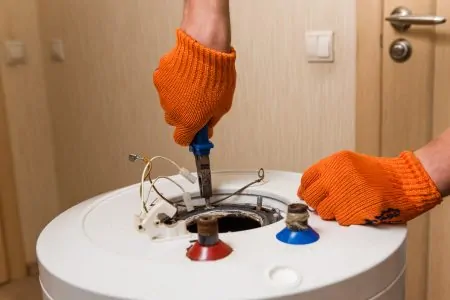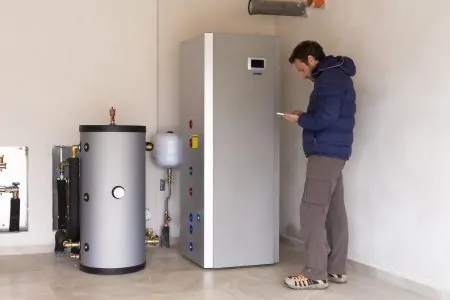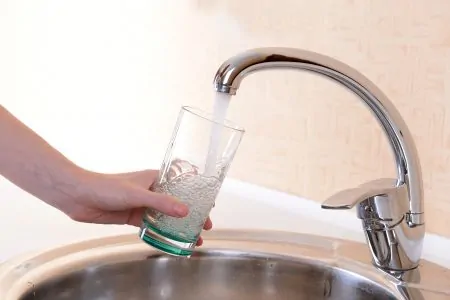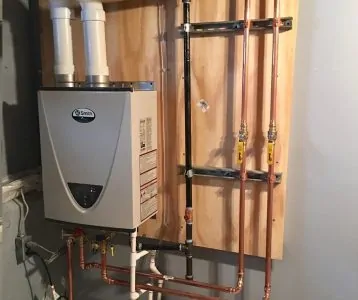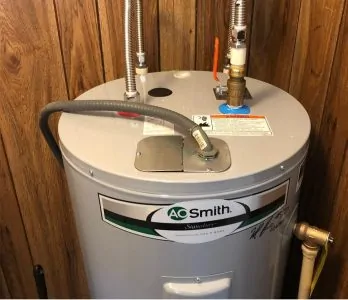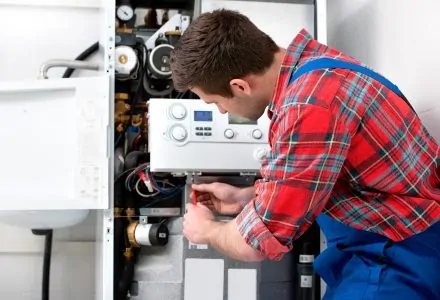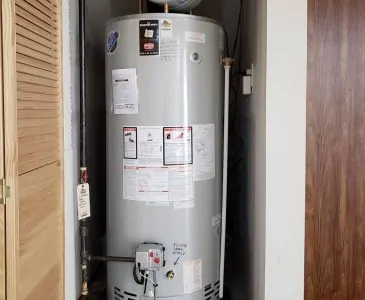Most water heaters make at least some noise, but usually it is quiet enough to go unnoticed. If there are unusual noises coming from your heater, it’s understandable to get worried.
There are many reasons for your water heater making different sounds when hot water is turned on. Some of these are nothing to worry about but others could indicate a developing problem.
This article will help you get a better idea of whether or not there is a problem with your heater, and offers solutions to some common problems. It’s important to address any heater issues as soon as possible to ensure you can keep using hot water.
Key Takeaways
- Common water heater noises include rumbling, popping, sizzling, and ticking, which can be caused by issues like sediment buildup or fluctuating water pressure.
- Regular maintenance, such as flushing the tank and cleaning or replacing the anode rod, can help prevent and fix noise issues.
- A noisy water heater is typically more annoying than dangerous, but ignoring the problem can lead to more significant issues over time.
- If you’re unsure about the cause of the noise or how to fix it, it’s best to consult a professional plumber for assistance.
Causes and Noises
Here are some of the most common water heater issues along with the sound your heater might make when heating.
1. Tank Buildup
Sediments, mineral deposits, and other buildup can cause trouble inside your water heater. Sediment is broadly defined as any sort of material that settles inside your tank. It could be sand or other debris that enters the tank with the water, or minerals released as the water is heated.
Sediment buildup can start as a minor problem, only slightly decreasing your unit’s efficiency. However, as it continues to accumulate it can cause clogging to the point that you can’t even flush the tank — this could require a full replacement.
Rumbling
You will usually hear this noise as the temperature increases inside the tank. As the water expands, it passes the sediment — it’s this interaction that causes the rumbling.
The sound tends to grow louder as more sediment collects. If the noise has become very noticeable, the buildup may have reached a critical level.
How to Fix It
Flush and drain your tank. You can use a deliming solution to help get rid of the sludge. If you don’t like the thought of using chemicals, try white vinegar.
Popping
Popping noises are usually caused by limescale, a common problem in areas with hard water. The minerals (calcium and magnesium) are found in the ground and absorbed by the water as it passes through.
While these minerals are beneficial for our health, they can be harmful to a water heater. As the water is heated within the tank, the minerals separate and form limescale.
Loose sediment on the bottom of the tank can also be a factor. Sometimes steam bubbles are formed beneath the sediment. As the water heats up, the bubbles burst, hence the popping sound.
How to Fix It
Try draining and flushing the tank to remove any mineral sediment. If your tank has a heating element, descaling it may reduce further deposits.
Sizzling, Hissing, and Crackling
These are typical noises from an electric water heater but they could also indicate trouble. As sediment builds up at the base of the tank, the lower heating element can become covered or buried.
When this happens, it’s unable to heat the water or function properly and starts making noise.
How to Fix It
You need to drain the tank completely and remove the lower heating element. Soak the element in a descaling solution, then use a wire brush to gently remove any residue.
2. Fluctuations in Water Pressure
As the water pressure changes, you may notice a few noises. These are usually caused by the pipes and plumbing, rather than your water heater.
Ticking
A ticking noise is the most common sound caused by changes in water pressure. Many water heaters use water outlet and inlet nipples with heat traps. The nipples are what connects the plumbing to the unit — they essentially improve efficiency.
The heat trap can sometimes cause the ticking noises. If this is bothering you, you can simply replace the nipples with a non-heat trap.
Pipes and plumbing are also notorious for making noise. As the water leaves the unit through the pipes, they expand or contract as the water warms or cools.
When they expand, they could be rubbing against the structure of your house. Loose straps can also result in a ticking noise.
How to Fix It
Follow the sound and try to find its source. You might only need to tighten any loose straps. However, if the noise still occurs, you can install spacers that will prevent the pipes from moving.
Reducing the water temperature by a few degrees can also prevent the pipes from expanding too much. This could be enough to eliminate any ticking noise.
3. Condensation Leaks
Condensation is usually found in gas-powered water heaters. As the cold water is heated, it can create a significant amount of condensation. New models even use this to their advantage — they are called condensing water heaters.
As the gas leaves the exhaust, it is very hot. In condensing models, they reuse the condensation to further heat the tank. This results in less energy being used and a much cooler exhaust, which is better for the environment (1).
Sizzling
If you can hear a sizzling noise from your gas-powered water heater, you may have a condensation problem. As the water heats and condensation is formed, it could be dripping down onto the burners, sizzling as it hits. This could indicate a leak within the heater.
How to Fix It
Check the immediate area around the unit to see if there are any obvious signs of water. However, this is probably a job for your plumber.
4. Restricted Water Flow
The valves of your water heater system are what controls the water flow. If the flow is limited, you might hear a significant noise.
Whistling, Squealing, Screaming or Singing
As the water tries to flow through a small opening, you might notice whistling, squealing, screaming, or screeching noises. Certain valves could be the source of this noise issue:
- T&P relief valve: The temperature and pressure relief valve is also known as a safety valve. It allows the water to escape if the pressure becomes too high inside the tank. If you suspect this valve is causing the issue, cut the power to your heater and call a plumber.
- Inlet valve: It could be that the inlet valve isn’t fully opened — this can greatly restrict the water flow. Check the valve and make sure it’s open all the way.
- Valves and lines: If you’ve checked the above and still notice some sounds, try inspecting the water lines and outlet valve. Check the lines for any flaws or kinks — the outlet valve should also be fully opened.
5. Water Source
Popping
An anode rod is an important component of a water heater — it helps prevent rust. If your local water supply is alkaline it could be causing a few problems inside your tank.
There are two main types of anode rod: magnesium and aluminum.
A popping noise is common if your water heater contains an aluminum type rod and is exposed to high levels of alkalinity. It’s believed that this type of metal reacts with the pH level of the water, creating a noise.
How to Fix It
If the aluminum anode rod is the problem, replacing it with a magnesium alternative might be the best solution.
6. Water Hammer
Banging, Knocking, or Hammering
Loud noises such as banging, knocking, or hammering are usually caused when the water is abruptly shut off. As it has nowhere to go, this causes the water to flow backward in your system. The resulting sound is often referred to as a Water Hammer.
It can potentially cause a water pipe to burst, creating a major problem in your home. It can also cause problems with your water heater.
Be Aware
How to Fix It
We recommend installing a water hammer arrestor (pressure reducing valve). This is a device designed to protect your plumbing, pipes, and tank by absorbing the shock created by the water hammer.
Tankless Water Heater Noise
Tankless water heaters aren’t known to create noises like tank models do. However, you may still hear pops or ticks or a sound like running water.
Clicking is common when the unit turns on and off. You might also hear other sounds if you live in a hard water area or if there is a buildup within the unit.
How to Fix It
Regular maintenance should help you stay on top of any unusual sounds.
